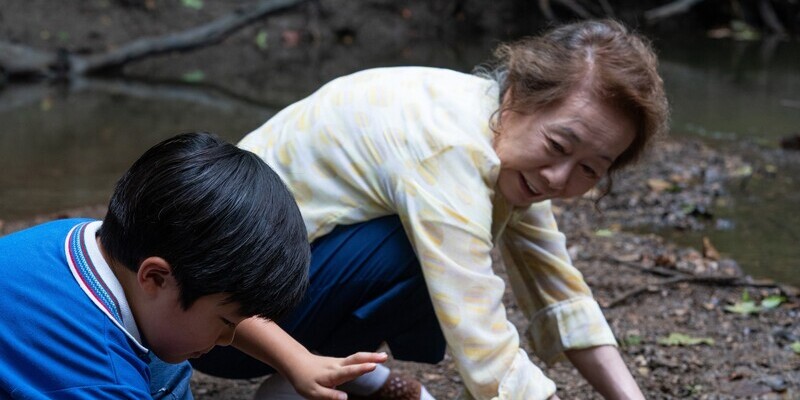
Review by
Eric Hillis
Directed by: Lee Isaac Chung
Starring: Steven Yeun, Han Ye-ri, Alan Kim, Noel Kate Cho, Youn Yuh-jung, Will
Patton

Inspired by his own childhood, writer/director Lee Isaac Chung's
1980s set Minari is an immigration tale that arrives at a
moment in time that makes it a hot-button topic, but ironically it has
more in common with Hollywood cinema of the 1930s and '40s than with its
contemporaries. The ethnicity of its protagonists aside,
Minari evokes American classics like
The Grapes of Wrath and
A Tree Grows in Brooklyn. In narrative terms it offers a conventional meal, but its particular,
personal spices give it a flavour of its own.

Having lived in a Californian city since arriving in the US a decade
earlier, Korean husband and wife Jacob (Steven Yeun) and Monica
(Yeri Han) have made the move to rural Arkansas with their
American born children, six-year-old David (Alan S. Kim) and his
older sister Anne (Noel Kate Cho). What Monica didn't realise is
that the new home her hubby has purchased is a trailer situated on a
clump of land he plans to turn into a farm on which to grow lucrative
Korean vegetables. With Monica already annoyed at how Jacob looked after
his parents financially rather than his own immediate family, this puts
an extra strain on a marriage already in turmoil.
Jacob and Monica take a job at a chicken hatchery, continuing a line of
work they practiced in California. The noise is unbearable to untrained
ears - a combination of chicken screeching and that industrial rumble
that soundtracks David Lynch's Eraserhead – but Jacob and
Monica have learned to block it out. Jacob is focused on the goal of
building his mini farming empire, recruiting a local elderly Evangelical
Christian oddball, Paul (Will Patton), to help him work the land.
Monica has no such distractions however, and feels isolated in her new
home. While Jacob wishes to leave the old world behind, Monica pines for
Koreans, if not Korea.

You might expect an immigration drama to focus on the struggles of
natives to accept new arrivals, but Minari is quite
the opposite. Initially, Jacob sees himself as superior to his Arkansas
neighbours, dismissing their religious ways as superstitious nonsense.
But he gradually learns that such an attitude is a middle class
privilege he can't afford. Working class folk are forced to get along
despite their differences, because at some point you're going to need
your neighbour to drive you to the emergency ward, and in that moment
you're not going to give a damn who they voted for or what God they
believe in. Chung sucks his liberal target audience into this notion,
with Paul initially coming off as the village idiot, but as the film
progresses, we realise, along with Jacob, that he has much to teach the
young Korean.
It's this aspect of community integration that's most refreshing about
Minari, particularly in these increasingly divided times. What a relief to
see white working class rural Americans portrayed with empathy rather
than disdain or suspicion. Like another recent immigration drama, the
Scottish set
Limbo, Chung's film portrays prejudice in daringly nuanced fashion, with a
local boy subjecting David to offensive language before immediately
befriending him.

If Jacob's story of accepting help from those he looks down on makes
for the film's strongest narrative, it's offset by the arrival of
Monica's mother, Soon-ja (Youn Yuh-jung), who with her constant
swearing and Rodney Dangerfield manners, seems to have wandered in from
a much less refined film. As the hip grandma, Soon-ja comes off as
clichéd, and too much of her dialogue is of the "life lesson from an
elder" variety. Much of the running time is devoted to her relationship
with David, who is so American at this point that he struggles to accept
Soon-ja's old world ways. It's certainly a cute dynamic, but all too
conventional. Conversely, too little time is offered to Monica, who is
largely relegated to the dated trope of the materialistic wife who won't
allow her husband to follow his dreams. Anne, meanwhile, is practically
a glorified extra.


